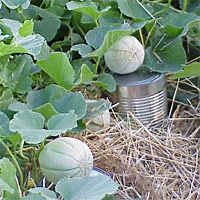Melon

If anything says "summer" to most folks, it's a juicy slice of a good ripe melon. In addition to the familiar cantaloupe and muskmelon, a number of more exotic melons are available to home gardeners.
About This Plant
Most melons need a long, warm growing season, usually 80 to 100 days, to reach maturity, so in regions with short summers, choose early-maturing varieties.
Consider growing some unusual types, including charentais and crenshaw. Where watermelon is concerned, you can now try compact, round (or "icebox") types, yellow-fleshed fruits, or seedless ones in addition to the traditional oblong types.
Site Selection
Select a site with full sun to light shade and well-drained soil. Choose a site in the warmest part of your garden, preferably a south-facing slope. Prepare the garden bed by using a garden fork or tiller to loosen the soil to a depth of 12 to 15 inches, then mix in a 2- to 4-inch layer of compost.
Planting Instructions
If your season is long enough, you can sow seeds directly in the garden after all danger of frost is past and the soil is warm. Otherwise, start seeds indoors in separate peat pots 3 to 4 weeks before the average last spring frost date. Melons need lots of space. Plan on leaving 6 to 8 feet between rows or beds. To increase soil temperature and hasten growth, cover the planting area tightly with black plastic mulch just before planting. Set transplants 1 1/2 to 2 feet apart in rows 6 to 8 feet apart. Keep the plants in their peat pots so as not to disturb roots. If seeding directly, plant seeds 1 inch deep and 4 inches apart.
Care
Thin when plants touch each other, leaving healthiest plants about 2 feet apart. If desired, cover rows with row covers to maintain warmth and promote fast growth. Water plants during the summer if rainfall is less than 1 inch per week. Contact your local County Extension office for controls of common melon pests such as cucumber beetles and squash vine borers.






 If anything says "summer" to most folks, it's a juicy slice of a good ripe melon. In addition to the familiar cantaloupe and muskmelon, a number of more exotic melons are available to home gardeners.
If anything says "summer" to most folks, it's a juicy slice of a good ripe melon. In addition to the familiar cantaloupe and muskmelon, a number of more exotic melons are available to home gardeners.